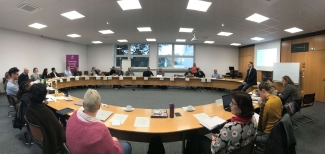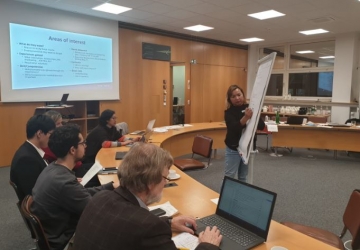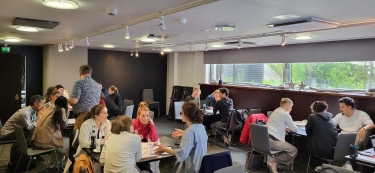What is the future of forest employment?

What is the future of forest-related employment and education in different countries around the globe? What are green jobs? Are there changes in forest sector employment? What are the major drivers of these changes – and how does tertiary education respond to them? These questions were discussed at the Bonn expert’s workshop that took place from the 18th to 19th November 2019 at the European Forest Institute (EFI) Bonn Office.
Experts from six continents gathered for the workshop “Forest sector employment, green jobs and forest education” to elicit overall trends in forest sector employment in the framework of the joint IFSA-EFI-IUFRO GREEN JOBS project.
The project invited senior experts and young scientists from Brazil, China, Finland, Germany, Indonesia, South Africa and the United States of America to share their experiences and expectations on forest sector employment, but also to discuss missing factors in the curricula on forest education.
Furthermore, the workshop intended to support and equip the next generation with important knowledge: The young generation is a key actor of the future, whether as professionals, leaders, or educators. Their skills and advocacy will be essential for strengthening the forest sector towards a sustainable future.
In advance of the workshop, one senior expert was “paired” with a junior scientist, both preparing the information about the forest sector employment and the forest education system for the same country. In addition, they had to elaborate on their personal perspective on changes in the employment fields and required skills and competences. In close collaboration during the workshop as well as in the aftermath of this event, the valuable contributions by the experts in terms of the country-based information were gathered. Soon, they will be included in so-called country reports.
Among others, the following pending issues were addressed during the workshop: How can curricula adapt to both, the student’s expectations and the market’s needs? How to pin down the main drivers of change in this sector, especially when the exchange of information is insufficient and possible career paths only accessible to a very few?
Obviously, there are no easy answers to these questions, but various ways in facing the described challenges. The lively discussions and the exchange of professional and personal experiences have shown that there is an increase of public interest in forest-based topics (such as forest-related education, recreation and health) which might affect the employment sector by offering new job opportunities.
After sharing experiences from various perspectives, the group finally risked an outlook on the future of forest employment. Despite the different regional approaches and different trends, the whole sector is facing challenges to modernise itself and being able to attract further public interest. This workshop was in line with the main idea of the project: bringing people together by providing network opportunities to young scientists and further engaging the youth in global science-policy processes and elaborating future trends in the forest sector.
You can read the full workshop report here.



